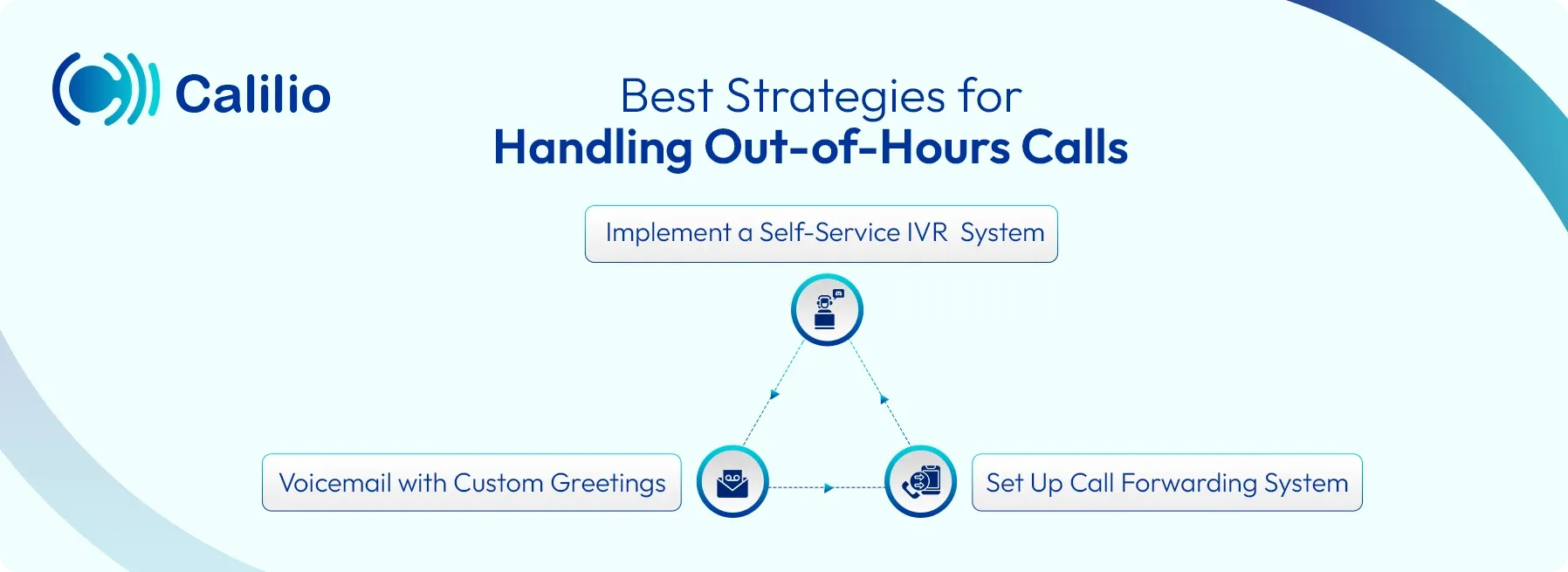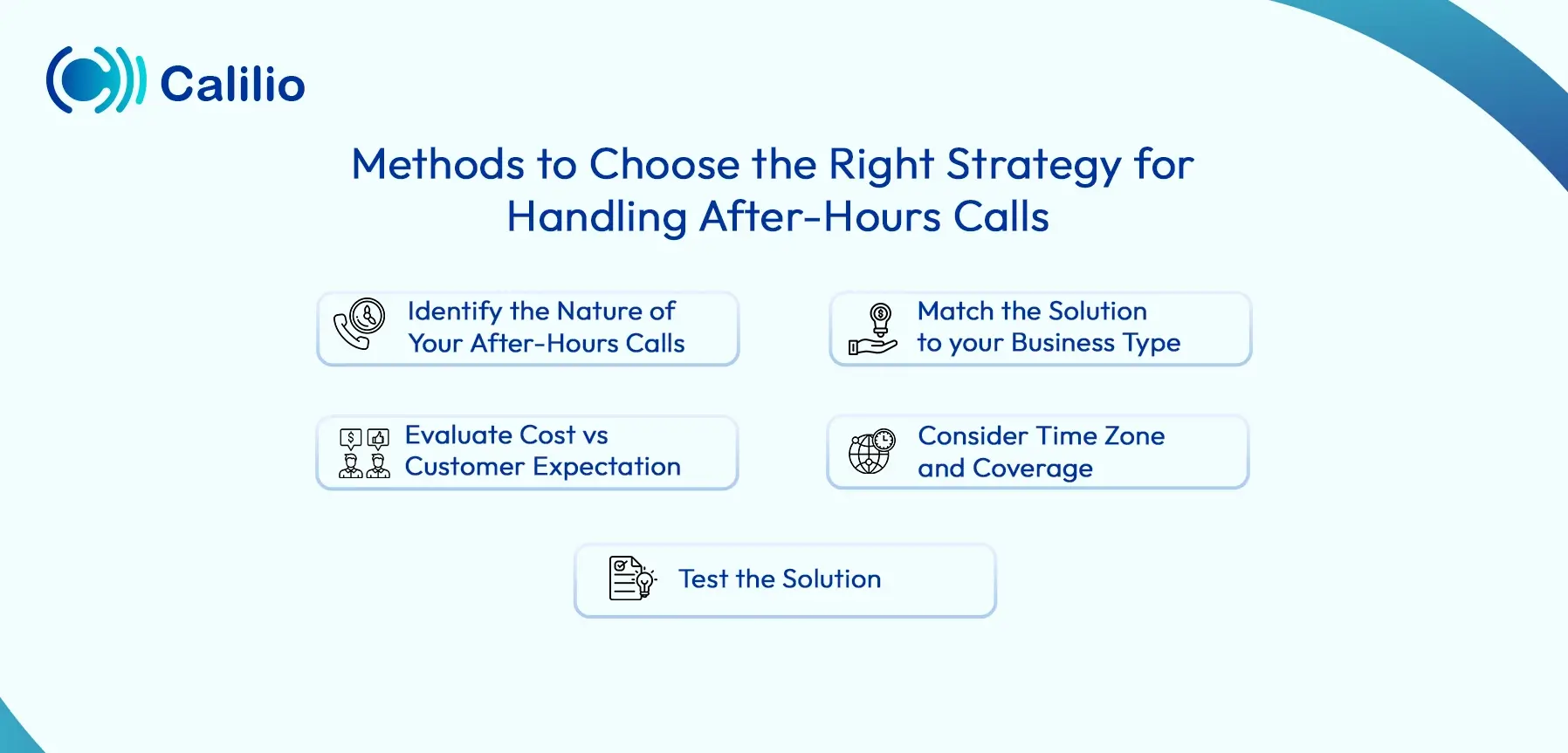Best Ways to Handle After-Hours Calls

Summarize this blog with:
Nowadays, every customer expects to get quick and reliable support even outside of regular business hours. However, handling out-of-hours calls can be a significant challenge for many businesses, especially when dealing with limited staff or resources.
Still, with the right strategies, businesses can maintain trust, stay competitive, and turn after-hours interactions into valuable opportunities.
In this guide, we’ll explore the 3 best ways of out-of-hours call management and the benefits of handling such calls. We’ll also discuss how to choose a service to help you efficiently oversee after-hours calls.
Highlights:
Handling calls outside regular hours ensures timely support, boosts customer satisfaction, and helps businesses capture urgent opportunities through automated call handling, 24/7 availability, and emergency call routing.
Effective after-hours call handling includes forwarding urgent calls, using personalized voicemail to capture messages, and offering self-service options for quick support.
To choose the right solution for after-hours calls, assess your business needs, including call volume and service level requirements, and consider features like call forwarding and a self-service interactive voice response system.
Benefits of Attending Customer Calls Outside of Office Hours
Handling calls outside of working hours allows businesses to offer continuous support, ensuring customer issues are addressed promptly, even outside regular hours. This improves customer satisfaction, reduces response times, and increases sales and brand loyalty opportunities.
- Improves Customer Satisfaction: Providing responsive support outside regular hours ensures customers can reach out when they need assistance, leading to higher satisfaction and loyalty.
- Increase Business Opportunities: You’ll never miss an opportunity, even from clients in different time zones, thanks to extended support hours.
- Enhance Brand Reputation: Providing 24/7 accessibility creates a positive impression among customers and strengthens your brand’s reputation, which can differentiate your business from competitors.
- Reduce Customer Churn: Even after hours, businesses can resolve problems before they escalate, reducing the likelihood of customer dissatisfaction and churn.
- Improve Crisis Management: After-hours call handling enables businesses to quickly address emergencies or urgent issues, minimizing potential disruptions and ensuring business continuity.
Best Strategies for Handling Out-of-Hours Calls
You can either set up a reliable call forwarding system, a professional voicemail with a custom greeting, or a self-service IVR (Interactive Voice Response) to answer calls after business hours.

1. Voicemail with Custom Greetings
A professional voicemail setup is a simple yet effective after-hours answering service. A voicemail greeting can provide helpful information such as business hours, alternate contact methods, or expected response times.
More importantly, callers can leave voicemail detailing their inquiries, concerns, or requests. This ensures that their needs are acknowledged even when live support is unavailable. Additionally, your team can review and prioritize messages at the start of the next business day, enabling timely and informed follow-up.
2. Set Up Call Forwarding System
One of the best methods for handling calls out-of-hours is to set up call forwarding in your phone system. This allows you to redirect incoming calls from your primary business number to a designated alternative number based on specific needs.
Depending on your phone system, you can set up call forwarding in different ways. For traditional landlines, you have to dial a specific code, and for a VoIP phone system, you can manage forwarding settings anytime through an online dashboard or a mobile app.
Never Miss a Call—Even After Hours
With Calilio’s Business Hours feature, stay connected with your customers even outside of your business hours.
3. Implement a Self-Service IVR System
Implementing a self-service IVR system is a highly effective strategy for after-hours customer support. Customers can access essential information and perform routine tasks without live agent assistance.
The IVR system can address common inquiries such as account balances, order status, and payment processing by guiding callers through keypad input. This ensures that customers receive immediate support and reduces the volume of after-hours messages and follow-up calls.
How to Choose the Right Strategy for Handling After-Hours Calls?
Selecting the right after-hours call handling solution depends on several key factors, including the urgency of your calls, your available resources, and your customer service standards.

1. Identify the Nature of Your After-Hours Calls
Determine whether after-hours calls are mostly urgent (e.g., technical issues, emergencies) or routine (e.g., inquiries, scheduling). Urgent calls may require call forwarding, while routine ones can be handled with a simple voicemail. For common FAQs, a self-service IVR system works well by allowing callers to resolve issues on their own.
2. Match the Solution to Your Business Type
If you’re a small business, you can adopt voicemail or IVR for after-hours support. In contrast, if you deal with high call volume in a customer-focused setting, a call routing and IVR combo might be the best.
3. Evaluate Cost vs. Customer Expectations
Choose a solution that fits your budget while meeting customer service standards. A simple voicemail is cost-effective but may delay responses. A live answering service offers faster resolution, but at a higher cost.
4. Consider Time Zones and Coverage
If you serve clients in different regions or countries, you may need 24/7 coverage. Choose solutions that support 24/7 availability across multiple time zones.
5. Test the Solution
Conduct a trial or pilot program before fully implementing a strategy. Monitor how well it handles calls, gather customer feedback, and evaluate reliability and professionalism. Afterwards, adjust your setup, like extending IVR options or refining forwarding rules, based on the results.
Conclusion
Having a structured after-hours call strategy ensures your business is always accessible, responsive, and professional. By implementing strategies such as professional voicemail greetings, call forwarding systems, self self-service IVR menus, businesses can ensure that every customer feels valued even outside of regular working hours.
Calilio Introduces Affiliate Program
Earn 30% lifetime commission on every paid referral.
Turn your audience, network, or customers into a recurring revenue stream.

30% recurring commission on every paid referral

Lifetime earnings for as long as the customer stays subscribed

Unique referral link with real-time tracking

Perfect for agencies, consultants, creators, and SaaS partners

Frequently Asked Questions
Why do customers call even outside of business hours?
Customers call outside business hours due to urgent issues, emergencies, time zone differences, or inability to reach support during regular hours.
Is handling after-hours calls expensive?
What industries benefit the most from after-hours call handling?

Still have questions?
Can’t find the answer you’re looking for? Please chat with our friendly team.
Stay in the loop
Get the latest call insights, trends, and updates delivered straight to your inbox.
By subscribing, you agree to receive updates from Calilio.
You can unsubscribe anytime.